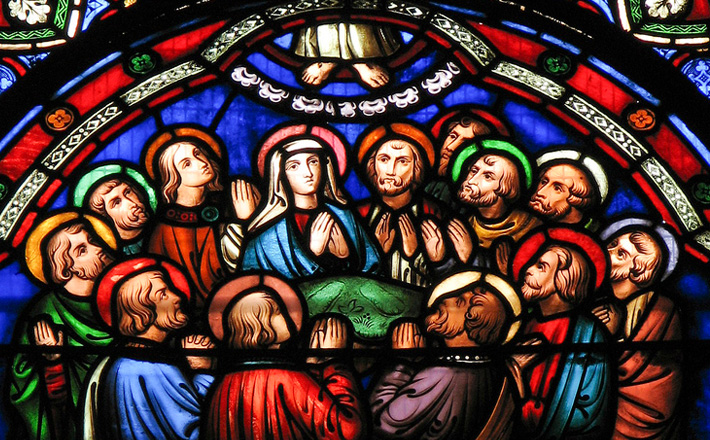Commentary on Psalm 68:1-10, 32-35
While Psalm 68 is fraught with interpretive difficulties — several one-of-a-kind words, obscure allusions, unknown geographical locations, and a less-than-clear structure — its general character and movement are clear enough.
As Konrad Schaefer helpfully suggests, Psalm 68 “is a hymn to God’s power and majesty … The overall impression is of a triumphal parade which culminates in Zion.”1
The celebration of “God’s power and majesty” explains why the lectionary associates Psalm 68 with Acts 1:6-14 and the Ascension of the Lord; however, this association also invites careful attention to one’s interpretive conclusions and hermeneutical directions, so that this portrayal “of a triumphal parade” not be allowed to serve as warrant for an unfaithful triumphalism.
Verses 1-3 introduce the cast of characters — God, of course, but also God’s “enemies”/”the wicked” (verses 1-2; see also verses 12, 14, 18, 21-23, 30) and “the righteous” (verse 3; see verses 7, 10, 25-27, 35). Verses 1-3 also anticipate the basic “plot” of the poem — along the way of a journey that moves from Egypt through the wilderness (verse 7), including Sinai (verse 8), toward and into the promised land (verses 10-16) ending at Zion (verses 17-23), God does indeed scatter God’s enemies. With their well-being secured by God’s powerful leading, God’s people celebrate in the Temple on Mount Zion (verses 24-27).
Along the way of the journey, the victorious God of Israel has appropriated functions that the Canaanites attributed to one of their gods, Baal — namely, the bringing of rain that yields agricultural productivity (see verses 8-10; and note that it is God, not Baal, that in verse 4 “rides upon the clouds,” and that in verse 33 is the “rider in the heavens”).
Along the way of the journey, the God of Israel has also bypassed another desirable location, Bashan (verses 15-16), in order to take up residence in Jerusalem on Mount Zion. Given the character, route, and destination of this “triumphal parade,” the people of God may been tempted to conclude something like this: Our God is better than your gods, because our God has defeated, scattered, and displaced your gods; and our God now lives in Jerusalem, which just happens to be our place — in other words, God is on our side!
In the presence of this sort of conclusion, the praise invited in verses 4, 32-35 (and note that the invitations to praise bracket the portion of the psalm that rehearses the “triumphal parade”) would amount to little more than an ideology of proud, prosperous, and powerful people who are attempting to give divine legitimation to a status quo that benefits themselves. What is to prevent Psalm 68 and its rehearsal of “a triumphal parade” from being appropriated as a crass, self-aggrandizing triumphalism?
It is as this point that verses 5-6 become so pivotally important. Immediately following the initial invitation to praise, verses 5-6 make it clear that the God of Israel, the sovereign (see “King” in verse 24) enthroned on Zion, is not merely a mighty warrior who scatters his enemies for the fun of it, or for the thrill of the battle, or for the purpose of just showing off.
Rather, God “fights” for the vulnerable and the dispossessed — orphans and widows (see Psalms 10:14, 18; 82:3; 94:6; 146:9; Exodus 22:22; Deuteronomy 10:18 and often in Deuteronomy; Isaiah 1:17, 23; Jeremiah 7:6), the homeless (see Psalm 113:7-9; Isaiah 58:7), the captives (see Psalm 146:7; Isaiah 49:9; 61:1). As James L. Mays concludes concerning Psalm 68:
In spite of its militant character and victorious confidence, such is not its spirit. There is a self-understanding and self-description in the psalm’s measures that belies such a reading. The uses assigned to the power of the LORD as divine warrior are crucial. The God who dwells in his holy habitation as victor is father of orphans and protector of widows, who gives the desolate a home and liberates prisoners (verses 5-6) …
The song belongs to the lowly, who in the midst of the powers of this world remember and hope for the victory of God.2
To praise the God who is the protector of the vulnerable (verses 5-6) and the provider for the needy (verse 10) means to conform oneself to God’s will, or in essence, to join God at God’s work in the world. The concluding “Blessed be God!” especially invites this conclusion. The verb translated “Blessed” means more literally “to fall on one’s knees in obeisance to” — that is, to submit. Such submission to God leaves no room for self-serving triumphalism.
Rather, Psalm 68 invites the people of God in all times and places to praise God by practicing the same compassion that characterizes God’s activity in the world. Only those who practice divine compassion can rightly claim that “God is on our side.” As Archbishop Oscar Romero once put it: “There is a criterion for knowing whether God is close to us or far away: all those who worry about the hungry, the naked, the poor, the disappeared, the tortured, the imprisoned — about any suffering human being — are close to God.”3
In keeping with the triumphal tone of the psalm, the final section (verses 32-35) contains four occurrences of a Hebrew word translated “mighty” (verse 33) and “power” (twice in verse 34 and once in verse 35). Power belongs to God (verses 33-34), but God also “gives power and strength to his people” (verse 35).
Again, as suggested above, this gift of power could be construed in a triumphant manner; but in view of the preceding material (especially verses 5-6, 10), the power given to the people is the strength to “fight” for protection of the vulnerable, provision for the dispossessed, and liberation for the oppressed. Insofar as the “triumphal parade” in Psalm 68 anticipates the Ascension of the Lord, the resurrection-power evident in the Ascension is the power to do what God wants done (see essay on Psalm 31:1-5, 15-16, Fifth Sunday of Easter).
Notes:
1 Konrad Schaefer, Psalms (Berit Olam; Collegeville, MN: Liturgical Press, 2001), 163-164.
2 James L. Mays, Psalms (Interpretation; Louisville: Westminster John Knox, 1994), 228-229.
3 From a sermon by Oscar Romero, February 5, 1978, quoted in In the Company of the Poor: Conversations with Dr. Paul Farmer and Fr. Gustavo Gutierrez, ed. Michael Griffen and Jennie Weiss Block (Maryknoll, NY: Orbis, 2013), 150.


June 1, 2014